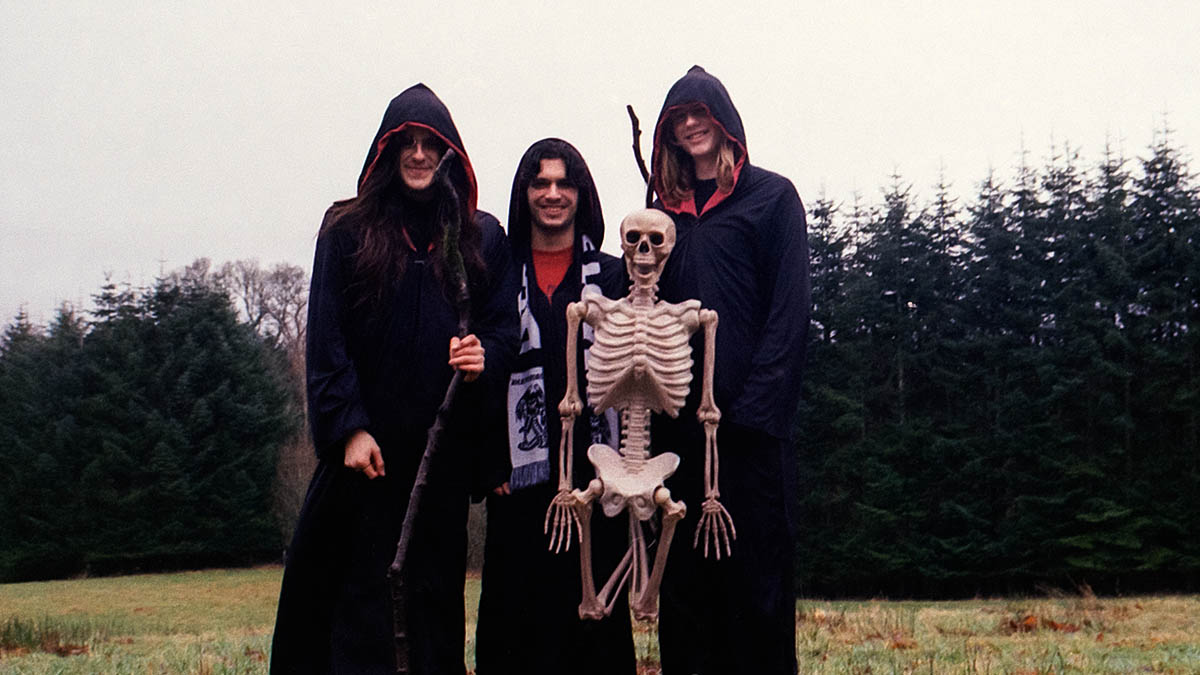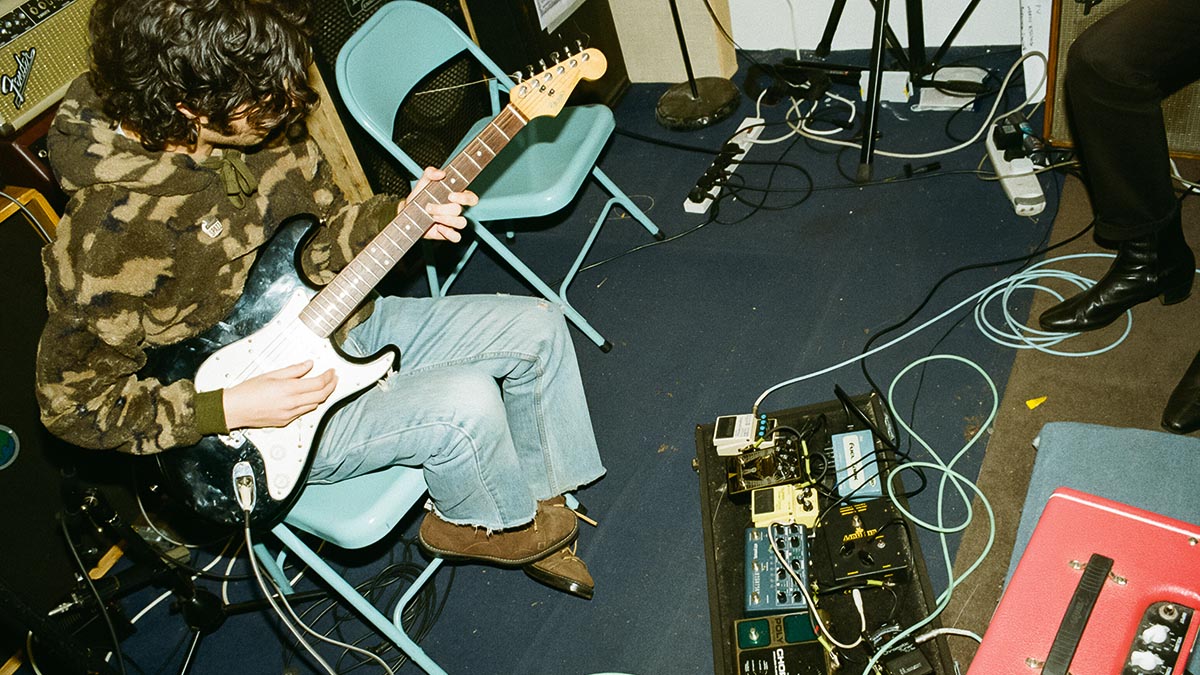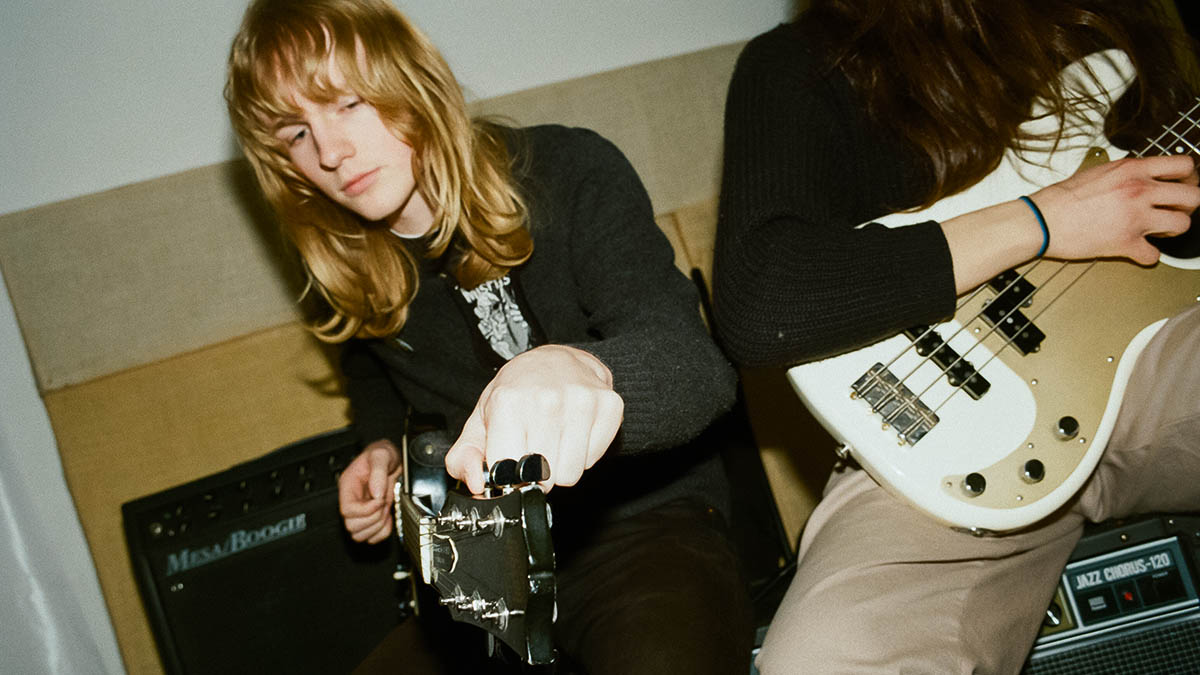Island of Love’s Karim Newble and Linus Munch: “When we started rehearsing we didn’t even have a fuzz pedal. We are still borrowing amps every single show”
The first UK band to be signed to Jack White’s Third Man Records are having big fun making big noise but can someone, anyone, lend these lovable rogues some gear?

Island of Love are a band with a wide dynamic range, big songs, big hooks and all the volume in the world, but none of the gear. They’ve made it this far without the latter.
That has become a thing – an in-joke. To say you are “Island of Lovin’ it” is to say you rock up to a show with a setlist and in desperate need of a loan – a guitar or maybe an amp to get the job done. This is de rigueur in the hardcore circles that guitarist/vocalists Karim Newble and Linus Munch moved in before putting Island of Love together, but it is unbecoming of a band who were the first to be signed to Third Man London, part of Jack White’s empire.
With that comes a certain expectation. “When we started rehearsing it we didn’t even have a fuzz pedal, and amps are definitely the next step for us,” says Linus. “We are still borrowing amps every single show.”
There is something about this absence of planning and preparation that is in keeping with how their self-titled debut tumbles out the speakers to ingratiate itself in the ear as though by accident. It’s music written in a key and from a perspective where we’d all like to live. Nothing sounds overworked. The sad songs sound happy. The happy songs sound sad.
All of them are a bit of both. Throughout is the sound of organic fuzz and drive – '70s brown, earth-tone corduroy, autumn leaves – and you can’t really decide whether this is a lost-and-found recording of '90s alt-rock or a record of now. Or even which side of the Atlantic you would find Island of Love.
They are out of time, out of place. When the album’s opening song Big Whale barrels out, your first thought might be Dinosaur Jr., and the US alternative rock canon. Other times there is no denying which island they’re from.
“Definitely, we are all really big fans of guitar music in general,” says Newble. “For me personally, it was a lot of the Seattle and outside of Seattle, the bordering scene. Built To Spill was always a big one, and for Linus it is more big, proper '70s stuff. On top of that, me and Linus – and Dan [Alvarez Giraldo, bassist] – bonded over love of really overtly British stuff, like The Cribs and The Maccabees, very British indie music. It’s a combination of all that.”
Get The Pick Newsletter
All the latest guitar news, interviews, lessons, reviews, deals and more, direct to your inbox!
That their sound is a dialog between both cultural perspectives is not radical in and of itself. There has always been that cross-pollination between both Anglophone nations. Way back it was Little Richard and The Beatles. In the indie era, you could hear the US influence on Johnny Marr’s guitar even in the quintessentially English sounds of The Smiths.
Island of Love are no different in that sense, and they too make something that’s all their own. The wild, falling-apart guitar volume of Neil Young was magnetic north for Munch. “Neil Young’s leads are just incredible, like they could come apart at any moment,” he says. “He’ll put feedback where he wants it.”
For Newble it is Rick Maguire from Pile, Steve Hartlett from Ovlov, and J Mascis, too. You can hear these cats in the Island of Love sound. But buried beneath is a sensibility Newble gleaned from legendary US acoustic pickers such as John Fahey and Michael Hurley.
There’s country there, too. Weekend At Clive’s leans into that steel-string renegade vibe, serving as an unaccompanied acoustic interlude before we get all tangled up in the bittersweet jangle of Charles. “A lot of stuff starts as a swung country song and then we find a way to make it four-to-the-floor,” says Newble.
Much of their writing is done at home, on acoustic, before presenting the song to the rest of the band ready to be augmented with bass solos, guitar solos, or even guitar harmonies that call to mind Thin Lizzy signed by Sub Pop. There’s a freedom to the recording that suggests the next time you hear these songs on a stage that they might have changed a little – that they might change a little from night to night depending on how the energy in the room is.
Before Island of Love started as a going concern, the pair would confer at Newble's mum’s house and find a poppier repository for all that hardcore punk energy they had. What if they could write hooks?
“We literally would be plugging straight in and using amp VSTs and plugins and throwing an overdrive on it and being like, ‘Oh cool, that’s finished,’” Newble says. “When we actually started jamming as a band it was just crazy hearing them without a robot drumming, and hearing it being real in a room. It’s that whole Dinosaur Jr. ethos of playing ear-bleeding country music. We love Sunn O))) and just crazy, grungy loud music. It is nice to bring a pop sensibility into that kind of world.”
That sound and the band, all came together in Fuzzbrain – an east London studio run by Ben Spence, who ended up producing the album after pretty much introducing them to every sound they would need to write, perform and record these songs. When Munch and Newble join us over video link they are at the Fuzzbrain. It’s central to their story.
“We literally all met here, all different ages, all playing in the same band and then just being in a similar scene, and trying to find people who are good at playing stuff,” says Newble. “You just bond over loving music and not knowing how to play it but having a space that gives you all the tools, all of the instruments.
“We didn’t even have to bring guitars, amps or leads. We just showed up and I’d say to Ben, ‘Oh, I’ve heard about this pedal, the Memory Man.’ And the next time I would see him he would have a Memory Man.”

Volume is key. That’s the emulsifier bringing all of this together. It makes the guitars sing. It works with the heartbreak songs. There is no better shield against feelings of romantic inadequacy than ear-piercing volume.
Those who enjoy feedback will get more out of an Island of Love live show than those who don’t. If you come along, bring a guitar, just in case.
Newble says they’re working on it. He provided someone a bit of art and in exchange they gave him a red Kramer Baretta that’s now his number one live guitar. “I would love to get some weird John Dwyer-like, metal, crazy-looking guitar,” he says.
On record, Munch used a Flying V. Live, he’ll be on the Jazzmaster. On record, Newble ran through British-style amps, while Linus used US amps. When they go on tour this summer their Spanish driver will hook them up with some amps. All of them will be cranked. There will be no dead air.
If the amplifiers aren’t pushed into the feedback then it’ll be Newble's broken guitar tuner screaming whenever he tries to return a string to pitch. Rock music, lest we forget, is after all an enterprise run on electricity. There’s something Nikola Tesla about having all that voltage and current to manipulate; there is a certain magic in the power to push air through a speaker cone, one that is not lost on Island Of Love.

“I have been leaning towards the idea of us getting huge stacks and playing onstage with them, and just having the option of cranking the stacks so you don’t have to worry about mic’ing them,” says Newble, warming to the theme. “There’s always the worry about not getting enough guitar. We have always been really anti noise-gating. I think it’s kind of nice when you are playing through a setup that sounds like it could explode. That makes it way more exciting. It makes it feel like you’re really rocking out!”
Sure, the sound engineers hate them. There will be those who turn up at an Island of Love performance only to be repelled by the two minutes of feedback that greets their arrival onstage like an astringent palate-cleanser. The Melvins used to do that sort of thing and use strobe-lighting. You have to get the audience’s attention somehow.
Coming from hardcore, Newble is not so sure how to read the Island Of Love audience. “It is hard to feed off it when you come from bands who people beat each other up to the music,” he says. They’ll deal with it the way they deal with any emotion. There is no plan, except this: “Play as loud as possible, have fun with it, and throw lots of goofy, warped solos in there…”
- Island of Love is out now via Third Man.
Jonathan Horsley has been writing about guitars since 2005, playing them since 1990, and regularly contributes to publications including Guitar World, MusicRadar and Total Guitar. He uses Jazz III nylon picks, 10s during the week, 9s at the weekend, and shamefully still struggles with rhythm figure one of Van Halen’s Panama.
“The rest of the world didn't know that the world's greatest guitarist was playing a weekend gig at this place in Chelmsford”: The Aristocrats' Bryan Beller recalls the moment he met Guthrie Govan and formed a new kind of supergroup
“We hadn’t really rehearsed. As we were walking to the stage, he said, ‘Hang on, boys!’ And he went in the corner and vomited”: Assembled on 24 hours' notice, this John Lennon-led, motley crew supergroup marked the beginning of the end of the Beatles





![[from left] George Harrison with his Gretsch Country Gentleman, Norman Harris of Norman's Rare Guitars holds a gold-top Les Paul, John Fogerty with his legendary 1969 Rickenbacker](https://cdn.mos.cms.futurecdn.net/TuH3nuhn9etqjdn5sy4ntW.jpg)





